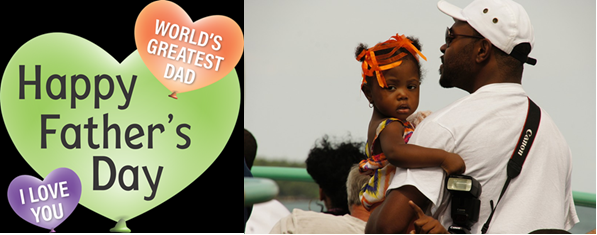
This Father’s Day, Making A Difference Foundation wants to do something different. We want to help break the myths of the absentee father in black communities.
As a black woman, with a strong black father in position, it’s important to address this issue. The truth is black fathers have received a tainted reputation, especially in the media, brought to the forefront by the social inequities the black community continues to face. So many good, honest, hardworking, loving black dads do not receive the recognition and positive attention they rightfully deserve. So many are stereotyped as being absent fathers who do not care about raising their children and being a part of the family unit.
Is this really the case? Is there really a lack of good father role models in black families?
We spoke to one local father, Larry Gramling, who has five children: two daughters and three sons. He’s currently retired from his own contracting business. He’s a kind man, easy to talk to, with a laugh that just makes you smile. And when he hears people talking about the “myth of the absentee father” in black culture, he doesn’t have words.
“Uncomfortable,” he said, when he asked how it makes him feel when the negative stereotypes about the black father. “Sad, even. It’s a feeling that you’re less than.” When Larry hears this, it feels like people are saying that black men in particular are not willing to do what it takes and step up into fatherhood, which he feels is not at all true.
“Black men work very hard to take care of their family and their children especially,” he said. For him, he feels that black men actually have a very strong sense of responsibility to their kids, but because of outside circumstances, it is harder for many.
The opportunities Larry speaks about include opportunities around finances, around education, and things that are necessary to step into fatherhood.
“The myth suggests that it’s just a choice that we’d rather neglect our families,” he said. “But it’s not a choice at all.”
It is easy to stand on the sidelines and cast stones at people whose lives you cannot understand because you are not them. Nevertheless, Larry urges people to put aside their judgements and try to understand what it is to be in their position.
“Put on our boots and do what it is we have to do, and then judge.”
Growing up and growing into fatherhood himself, Larry had to fight through the myths and stereotypes that surround the black community, myths that persist today.
“All that I was taught when I was younger, so many things I believed that were wrong,” he said. “They’re still wrong, but our people buy into them, they believe them.”
Moreover, Larry decided that he wanted to fight against the myths he had been told. Not against anyone, but against himself. He did not want to buy into these lies. He wanted to rise above the myths to show the truth.
“I fought and I persevered,” he said. “I did what was different.”
That does not mean what Larry did was easy. It took hard work for him to fight against all the myths he had been told to believe his whole life. However, even with all the obstacles in the way, he believes that the myths can be dissolved.
“I think that if we can just relax and not let the lies win, not let the opposition deter us, we can still win. It’s worth it. It’s a fight and it’s worth it.”
Here are the five top myths being perpetuated on the black community regarding fatherhood:
Myth #1: Unmarried black parents mean a child is fatherless.
Oftentimes, the statistics presented count single black mothers and correlate that to absent fathers. This many times not the case! Just because the parents are not married does not mean the father is not in the picture and not interacting with his child. According to the CDC, “Most black fathers live with their children. There are about 2.5 million who live with their children, and 1.7 million who don’t.”
Myth #2: Black fathers are less involved with parental duties or raising their children.
Black dads who live with their children are, on average, actually more involved than their counterparts, according to a CDC study. In fact, a report by the National Center for Health Statistics, black fathers are more involved with their younger children, feeding, bathing and dressing, reading to, and playing with them daily. For older children, these fathers are also more likely to help with homework and talk to their children about their day.
Myth #3: Black fathers do not want to own up to and handle their parental responsibilities.
Unfortunately, what the data rarely shows is that many black fathers cannot live up to their responsibilities. Why? Because there is a larger number of black men to other races that are taken away from their families through death – whether by natural causes, accidents, or by violence. In addition, a disproportionate incarceration of black men than other races puts fathers in jail only to leave children fatherless.
Myth #4: Many black fathers do not provide for their children.
Black dads want to provide for their children, not only with their time, but also with financial means. However, for so many, the system is set up against them. There is still an income gap for black workers vs. their white counterparts. When black men make lower incomes, this can affect their ability to support their children. If they miss child support payments, they risk many consequences that make it even harder to meet their obligations to their kids. Low pay, loss of a job, loss of their license due to lack of court-ordered payments…the system highlights the numerous inequities that still make it hard for black fathers to be there for their children.
Myth #5: The issue of father absenteeism is cultural problem solely within the black community.
Yes, there are problems with missing fathers within the black community; but it isn’t just their problem. Fatherlessness crosses over each race demographic and has been on the rise in white and Latino communities as well. And making it all about one race only pushes a false narrative that hurts that community by continuing the inequities and injustices they face.
Making A Difference provides services across the Pierce County area, serving all races and demographics. We work closely with the black communities and communities of color and see so many amazing fathers and father figures loving, supporting, and being there for their children, whether in a family unit household or within a split home. These fathers work hard every single day doing what needs to be done, oftentimes despite the challenges they face in today’s society. Its not unique but normal despite the lies, and the derogatory myths that are being perpetuated. Stand strong Larry and all of the black fathers in this country. We need you. We support you. We love you.
This Father’s Day let’s break stereotypes and bust myths. Fatherhood does not have a skin color.

